

Define a Target Market for Your Small Business. For your business to succeed, it must have enough customers to buy the product or service offered.
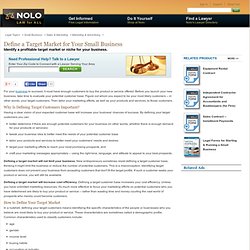
Create Your Ultimate B2B Customer Profile. Here we are at last—the final installment of our series, Target Your Ideal Customer With Personas.

We’re so glad you’ve joined us, and we firmly believe your team’s marketing strategies will be the brainier for it! In previous installments, we’ve discussed the whys and hows of building a more evolved customer profile, The Whole Brain way. The “why”? Your business succeeds when you know your audience and speak directly to their needs. The “how”? If you’ve been following the series from the start, you’ve already done the hard work of gathering data about your ideal customers. Create An Ideal Customer Profile.
Once you’re in a conversation with a sales lead, your primary job is to eliminate the lead from your list {tweet this}.
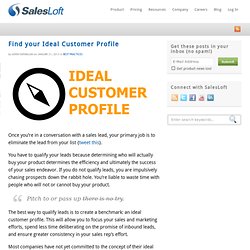
You have to qualify your leads because determining who will actually buy your product determines the efficiency and ultimately the success of your sales endeavor. If you do not qualify leads, you are impulsively chasing prospects down the rabbit hole. You’re liable to waste time with people who will not or cannot buy your product. Pitch to or pass up there is no try.
The best way to qualify leads is to create a benchmark: an ideal customer profile. Most companies have not yet committed to the concept of their ideal customer profile. There is an ideal customer archetype for your company and product. . #1 What is the ideal size of your prospect’s company? Remember, bigger is not always better. Six steps to defining your target market. Whether you sell washing lines or wiper blades, you need to understand your customer if you want to maximise your sales.
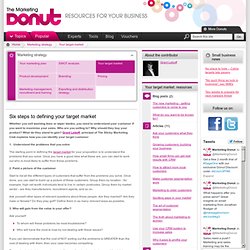
Who are you selling to? Why should they buy your product? What do they stand to gain? Grant Leboff, principal of The Sticky Marketing Club explains how you can identify your target customer 1. The starting point in defining the target market for your proposition is to understand the problems that you solve. 2. Start to list all the different types of customers that suffer from the problems you solve. Ask yourself other types of relevant questions about these people. 3.
Ask yourself: B2B Marketing Directions: How to Build a Better Profile of Your Ideal Customer. Do You Know Your Target Market? How to Find Out... Do you know who your target market is?
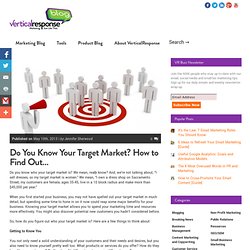
We mean, really know? And, we’re not talking about, “I sell dresses, so my target market is women.” We mean, “I own a dress shop on Sacramento Street, my customers are female, ages 35-45, live in a 10 block radius and make more than $45,000 per year.” When you first started your business, you may not have spelled out your target market in much detail, but spending some time to hone in on it now could reap some major benefits for your business. Knowing your target market allows you to spend your marketing time and resources more effectively. So, how do you figure out who your target market is?
Getting to Know You You not only need a solid understanding of your customers and their needs and desires, but you also need to know yourself pretty well too. Let’s say you’re a tax accountant who offers tax preparation services. How to Define Your Target Market. 10 Questions to Ask Before Determining Your Target Market. The better you understand your customer, the faster your business will grow.
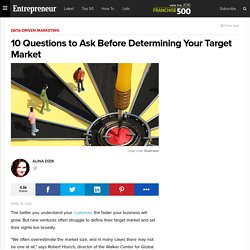
But new ventures often struggle to define their target market and set their sights too broadly. "We often overestimate the market size, and in many cases there may not be one at all," says Robert Hisrich, director of the Walker Center for Global Entrepreneurship at the Thunderbird School of Global Management in Glendale, Ariz. Here are 10 questions that can help you determine whether you have a target market and what it is: Who would pay for my product or service?
First, try to understand the problem that your product or service can solve, says Greg Habstritt, founder of SimpleWealth.com, an Alberta, Canada-based advice website for small-business owners. Who has already bought from me? Am I overestimating my reach? What does my network think? Am I making assumptions based on my personal knowledge and experience?